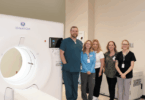Your heart, a robust yet small muscle roughly the size of a fist, pumps blood through the body, delivering oxygen and nutrients and carrying away waste. To accomplish this essential task, the heart beats roughly 100,000 times per day, around 35 million times per year, and more than 2.5 billion times during an average lifetime.
Here’s another number worth knowing: Three – as in there are three key areas where the right choices can pump up your heart’s health and lower your risk for heart disease.
“The top risk factors you can modify to significantly improve your heart’s health involve weight, exercise and tobacco. When I see patients who are overweight, are sedentary and/or who smoke, I tell them it’s time to be proactive,” stresses Keyoor Patel, DO, a medical cardiologist at UHS.
Decreasing modifiable risk factors is worth the effort, reports the American Heart Association, since a heart-healthy lifestyle can prevent up to 80 percent of heart disease and stroke.
To begin taking proactive heart-healthy steps, consider how close you come to hitting the following numbers. If you’re off the mark, talk to your doctor about taking action.
 >18.5 to 24.9 is the normal BMI for most adults. A BMI of 25 to 29.9 is considered overweight; a BMI of 30 or more is considered obese.
>18.5 to 24.9 is the normal BMI for most adults. A BMI of 25 to 29.9 is considered overweight; a BMI of 30 or more is considered obese.
Extra weight puts unhealthy stress on your heart. To determine if your weight is increasing your risk for heart disease, measure your body mass index (BMI), calculated with your weight and height. To find your BMI, talk to your doctor or use a “BMI calculator.”
“When someone’s BMI is too high, I suggest dropping 1 or 2 pounds a month—so by the end of the year they’ve lost 12 to 24 pounds. Even losing 3 to 5 percent of your body weight can decrease heart disease risk,” Dr. Patel advises.
There is a caveat, Dr. Patel adds. A healthy weight, he says, is not based solely on what the scale says. It needs to reflect a healthy diet. Slashing calories without regard for proper nutrition can trigger other risk factors for heart disease, so in the end you’re not doing all you can to protect your heart’s health.
0 is the number of cigarettes allowed daily. Chemicals in tobacco smoke damage blood cells and vessels and impair heart function and structure. All this damage increases risk of atherosclerosis, a disease that results in a waxy substance, called plaque, that builds up in your arteries and over time limits the flow of oxygen-rich blood through your body.
10,000 steps a day is the recommended daily step count. The Surgeon General recommends 30 minutes of activity most days of the week. Cumulatively, a half hour of constant activity equals roughly 10,000 steps.
Staying active accomplishes two imperative goals. First, it burns calories to help lower your BMI. Second, it increases your heart’s strength, just as exercise strengthens any muscle. When your heart is stronger, it can pump more blood through the body with every beat and work at maximum level with less strain.
“If 10,000 steps is too much for you, start with 1,000 steps and gradually add steps until you hit 10,000,” Dr. Patel recommends. “It’s more of a goal. The point is to stay active. If you go to the supermarket, park in the farthest spot. Take the stairs instead of the elevator if we’re only talking about a couple of floors.”
The UHS Stay Healthy Center offers several opportunities to help you quit tobacco use and stop smoking. For information, call 763-6060.
A few more numbers
Eating a balanced, nutritious diet, getting plenty of exercise and not smoking often reduces or resolves additional risk factors associated with heart disease. These factors and their associated healthy numbers include:
- CHOLESTEROL: A total score of less than 180 mg/dL is considered optimal.
- BLOOD PRESSURE: Less than 120/80 mmHg is the goal.
- FASTING GLUCOSE: Associated with diabetes, glucose should be less than 100 mg/dL.
“Because heart health risk factors overlap, I don’t recommend focusing on one risk factor. What you want is a 360-degree view of all your risk factors combined,” emphasizes Afzal ur Rehman, MD, PhD, managing director of the UHS Heart and Vascular Institute. “So if your cholesterol levels are elevated, you’re obese and you live a sedentary lifestyle, you want to begin with a healthy diet and exercise before turning to medication that addresses only cholesterol. The same is true for high blood pressure.”
On the other hand, Dr. Rehman adds, if you have all modifiable risk factors for heart disease under control and one number still isn’t where it should be, then it may be time to discuss medication.
Looking at cardiac disease risk factors as one complete package also clearly points out where and how the patient can take charge of their own health. “When patients realize that they have the power — and responsibility — to reduce as many health risks as possible, then it is much easier to achieve success.
“It’s the healthiest mindset you can have to protect your heart,” Dr. Rehman says.
UHS welcomes new cardiologist
UHS is pleased to announce that Roman T. Pachulski, MD, FRCP(c), FACC, has joined the UHS Heart and Vascular Institute. Dr. Pachulski is board certified in cardiovascular disease, clinical cardiac electrophysiology and internal medicine.
After earning his medical degree from the University of Ottawa in 1983 and then completing his fellowship in cardiology at the University of Ottawa Heart Institute, Dr. Pachulski went on to become a recognized cardiac specialist and educator of other physicians. In addition to his clinical and classroom contributions, Dr. Pachulski has also authored four medical books and is frequently invited to guest-lecture at medical conferences.
Dr. Pachulski comes to UHS from South Texas Heartbeat, where he was recognized for performing many leading-edge cardiac procedures, such as ablation for treatment of cardiac arrhythmias and automatic implantable cardioverter defibrillator (ICD) implantation. Conditions he treats include angina and acute coronary syndrome and aortic aneurysm.
To make an appointment with Dr. Pachulski or any of the other cardiologists at the UHS Heart and Vascular Institute, call 763-6580.
STRESSED OUT?
Chronic stress can increase the risk for heart disease. Find out why and what you can do about it.







